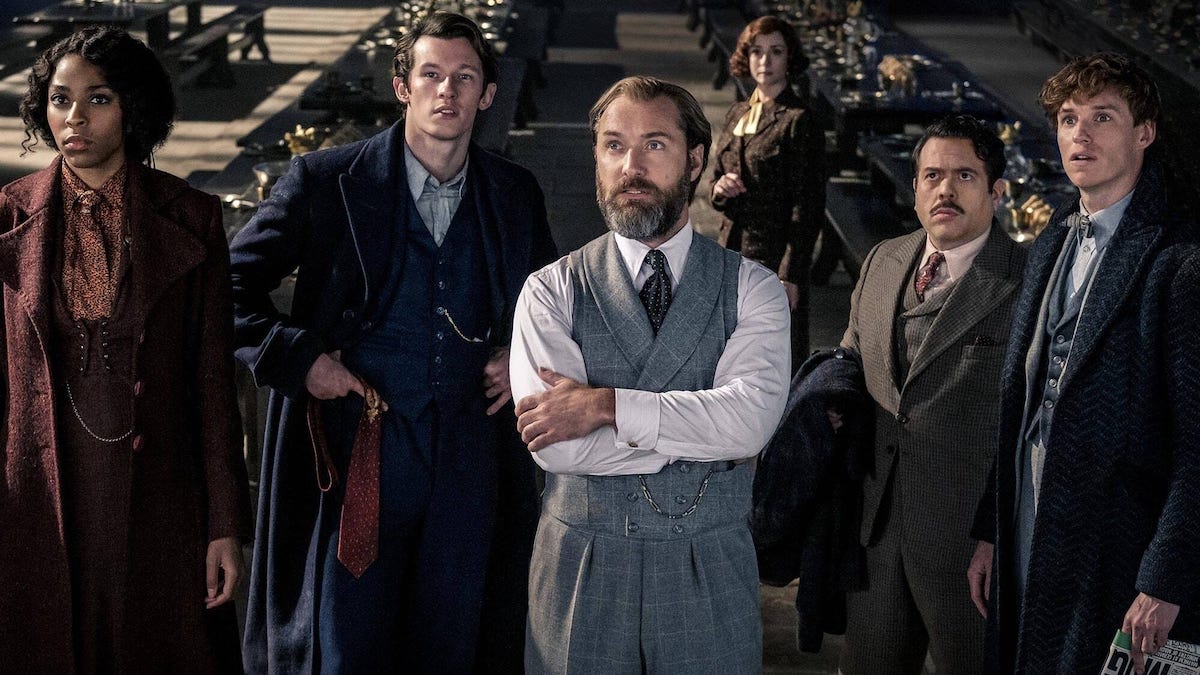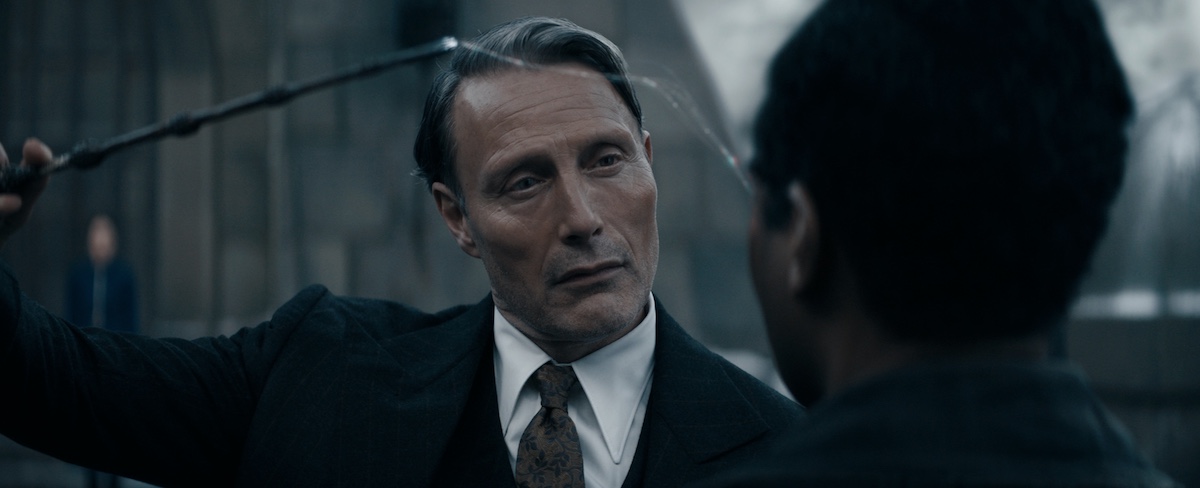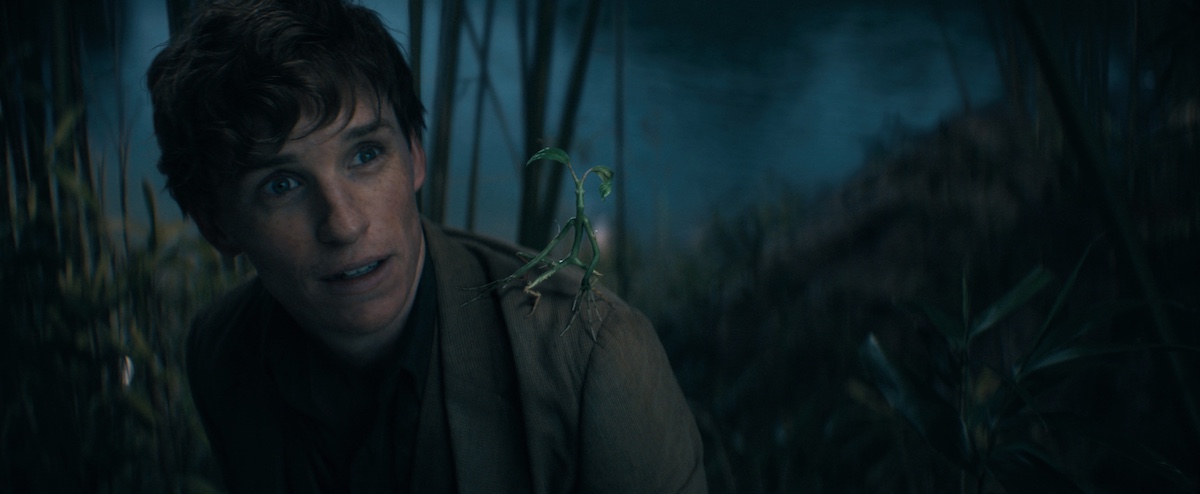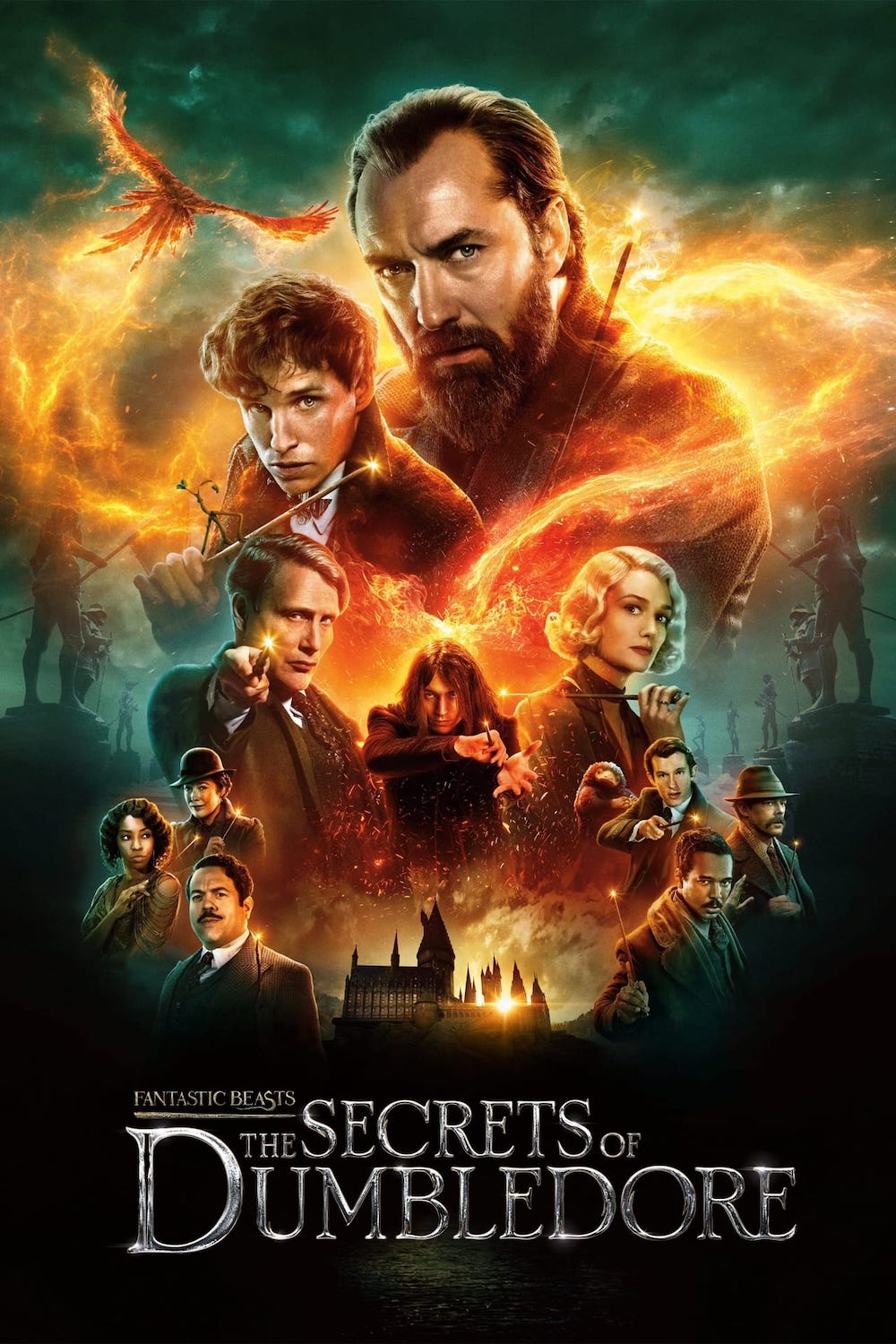FANTASTIC BEASTS: THE SECRETS OF DUMBLEDORE (2022)
Albus Dumbledore concocts a plan to prevent ex-lover Grindelwald from becoming the leader of the Wizarding World through deception.

Albus Dumbledore concocts a plan to prevent ex-lover Grindelwald from becoming the leader of the Wizarding World through deception.


Magic’s been in short supply with the Fantastic Beasts series, which has the unenviable task of broadening and developing the lucrative Harry Potter franchise. Fantastic Beasts and Where to Find Them (2016) was an interesting attempt to expand on the ‘Wizarding World’ by relocating to the United States, even if the adventure itself was relatively tame, but what should have been a single story for renowned magizoologist Newt Scamander (Eddie Redmayne) was suddenly granted four direct sequels, starting with Fantastic Beasts: The Crimes of Grindelwald (2018). Only now the franchise’s A-list attraction as evil wizard Grindelwald, Johnny Depp, had become a problematic figure accused of domestic abuse, and the film itself was saddled with a needlessly complex plot that didn’t go anywhere interesting. And now, after a delay due to the coronavirus pandemic, Fantastic Beasts: The Secrets of Dumbledore arrives to even less public excitement, even with Mads Mikkelsen (Another Round) replacing Depp, thanks to the dual PR nightmares of creator J.K Rowling now branded a transphobe and star Ezra Miller arrested for assault a week before its premiere.
Of course, the ugliness surrounding Fantastic Beasts‘ production shouldn’t matter if art can be separated from the artist. But there’s still the issue that these prequels have intentionally dispensed with everything that made Harry Potter a delight to legions of fans, not least the child-like wonder of the world things are taking place in. The Potter saga followed little kids as they attended an enchanted school, learned spells, solved mysteries, and over eight movies matured into young adults ready and able to fight a supreme evil. Children at the time could see themselves in these characters and grew up alongside the release of the movies, while young at heart grown-ups could lose themselves in a rich world of creativity and imagination.

In contrast, the Fantastic Beasts movies are devoid of all that playful innocence and coming-of-age appeal, instead following a group of middle-aged adults who are the teachers and ministers of this Wizarding World. The story takes also places a century ago, which adds a distance to the appeal of our own humdrum lives co-existing alongside one of true magic and wonderment. And it’s ultimately about politics and prejudice, in a way that was more subtext with Dark Lord Voldemort in the Potter story. I remember the disappointment when George Lucas threw out the fairy tale charm of his original Star Wars trilogy, to make a prequel trilogy that opened with talk of trade blockades. One wonders if J.K Rowling has similarly lost the innocence and accessibility of her own Harry Potter stories, first published when she was 32, and now in her mid-fifties she can’t help moulding her creation around life’s harsher realities.
Fantastic Beasts: The Secrets of Dumbledore benefits from the return of Steve Kloves, who’s a better screenwriter than Rowling and likely helped focus this entry’s storytelling. I can barely remember what happened in the rambling previous instalments, but there’s expositional dialogue intended to reestablish the most important stuff most will have forgotten by now. The franchise continues to shift away from Newt Scamander, somewhat, with an even greater emphasis on Albus Dumbledore (Jude Law) thanks to the title. Indeed, the emotional crux of the story is the tragic, broken relationship between Dumbledore and Grindelwald as ex-lovers now at opposing ends of an ideology about how wizards should be treating the non-magical ‘Muggles’. I only wish we’d been shown them as best friends and lovers, so we could truly grasp what’s been lost in their falling out. But there’s not even a flashback to that effect.

The first two films were set primarily in New York City and France, so the Fantastic Beasts world tour now continues into Germany. It’s one of the saga’s joys that we see different places and cultures in a magical context, even if 1920s Germany isn’t radically different to 1920s England, but the storyline about Grindelwald trying to become the Supreme Mugwump (i.e. leader of the Wizarding World) by stealing an election has clear parallels to the rise of unworthy leaders like Donald Trump today, who are autocrats that despise democracy but are able to convince enough voters into letting them take power and abuse it. And given the era and location, there’s unavoidable crossover with the rise of fascism in Europe, which it’ll be interesting to see if the concluding two films tackle head-on. I have doubts the real-life horrors of World War II will sit comfortably within a family-friendly franchise about sorcerers somehow being unable to rescue millions of Jews from concentration camps.
The positives of The Secrets of Dumbledore is that the core relationship between Dumbledore and Grindelwald is more believable here. It’s perhaps no coincidence Mikkelsen has form playing gay villains who hold a candle for their adversary, having done much the same thing in NBC’s acclaimed Hannibal series. He certainly feels like a more nuanced character than Depp was interested in playing, even if Mikkelsen’s take is less visually interesting and perhaps not as operatically nasty. But the story now requires Grindelwald to present himself as a misunderstood politician of sorts, so it’s a necessary recalibration. It’s just strange they don’t explain the sudden change of actor, considering how magic’s an easy way to suggest Grindelwald has a tendency to alter his own form.

A lot of the film is a Cold War-style mission into Germany, with Dumbledore gathering an Ocean’s Eleven-style team to defeat Grindelwald despite him having the ability to glimpse the future and outmanoeuvre them. So we have Newt rescuing his brother Theseus (Callum Turner) from a monster pit, and affable baker Jacob Kowalski (Dan Fogler) drawn back into matters by Professor “Lally” Hicks (Jessica Williams) to become part of a ‘three card monte’ deception involving identical suitcases. And as a major subplot, there’s the leftover business from Crimes of Grindelwald about mentally disturbed henchman Credence Barebone (Ezra Miller) grappling with the reveal he’s actually Dumbledore’s own nephew, Aurelius.
However, while Secrets of Dumbledore surpasses Crimes of Grindelwald because the storytelling’s more disciplined and events are kept relatively simple, it’s often a slightly tedious experience that isn’t especially thrilling. Considering it cost $185M it’s hard to see where the money went at times, although I’m sure we take for granted how believable everything looks on screen nowadays. But just in terms of big set-pieces and moments of action and VFX spectacle, there isn’t a lot here and the subdued climax is more character-based than anticipated. And while that’s encouraging to the excesses of competing franchises like Marvel, for a major blockbuster things are kept maddeningly small-scale and it’s like watching an old-fashioned espionage drama with wands rather than an exciting adventure full of magic and strange creatures. Again, there’s a feeling the creative minds behind Fantastic Beasts have become more interested in ideas and stories that leave kids charmed by talking hats and flying broomsticks a little nonplussed.
There’s a degree of imagination and fun to be found in Secrets of Dumbledore, but it’s mostly in the service of world-building than anything that truly captures the heart and mind. Maybe it’s time for David Yates, who’s directed absolutely everything Harry Potter related since Order of the Phoenix (2007) to step aside and let someone new rejuvenate this magical world, which has become so gloomy and depressing.
UK • USA | 2022 | 142 MINUTES | 1.85:1 • 2.39:1 | COLOUR | ENGLISH • GERMAN


director: David Yates.
writers: J.K Rowling & Steve Kloves.
starring: Eddie Redmayne, Jude Law, Dan Fogler, Alison Sudol, Callum Turner, Jessica Williams, Katherine Waterston & Mads Mikkelsen.
